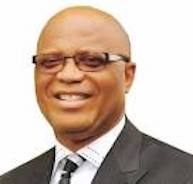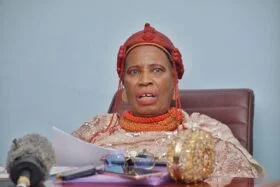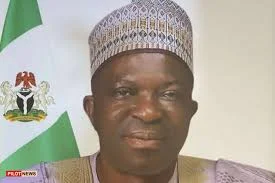COVER
Budget Support: FG Begins Deduction of N614b From 35 States
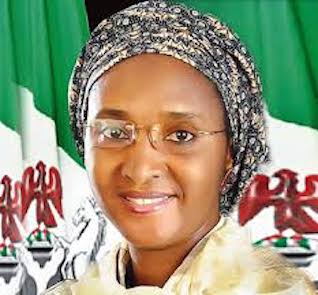
… Earns N2trn Revenue in Six Months
By Tony Obiechina, Abuja
The Federal Government will from this month begin deductions from state government allocations, the N614 billion bailout funds extended to them as budget support funds.
The Minister of Finance, Budget and National Planning, Mrs Zainab Ahmed made the announcement while outlining the Draft 2020-2022 Medium Term Expenditure Framework and Fiscal Strategy Paper (MTEF/FSP) in Abuja on Tuesday.
The Minister pointed out that the deductions will be made during this month’s Federation Accounts Allocation Committee (FAAC) meeting.
“The recovery process for us is to deduct from the FAAC allocation to the states and then we remit to the CBN and we are going to start this remittances by the next FAAC so there will be no requirement for us to consider the FSP implementation.
“We do that as a matter of wanting the states to stay on the path of fiscal sustainability but it will not be a condition for the deduction. We will deduct direct at source and remit to the CBN”.
The Minister further stated that ,”the N614 billion bail out funds to states was not going to form part of the revenue for funding the budget, it was a loan which was advanced by the CBN and the repayment will be made to the CBN”.
Ahmed who put personnel cost, inclusive of Pensions at over N3.0 trillion has continued to rise said the Federal Government was however talking steps to contain the situation.
To this end, she warmed that in keeping with Presidential directive, Ministries, Departments and Agencies (MDAs) which failed to implement the Integrated Personnel Payroll Information System (IPPIS) by the end of next month will not be paid their salaries.
” On the expenditure side of the framework, we have tried to keep most expenditure items as low as possible “, the minister pointed out.
On inflation, the minister said ” except for a few months, inflation has continually declined since January 2017 from 18.72% to 11.08% in July 2019″.
“Our Real GDP growth projections are rates of 2.93%, 3.35% and 3.85% for 2020, 2021 and 2020, respectively. Even though this falls short of the ERGP projection, the trajectory remains in the right direction”, she added.
Mrs Ahmed also disclosed that the Federal Government, was proposing to spend a total revenue of N7.6 trillion in the 2020 Budget with overview expenditure of N9.7 trillion.
” The draft 2020-2022 Medium Fiscal Framework shows that Nigeria faces significant medium-term Fiscal challenges, especially with respect to revenue generation and rapid growth in personnel costs”, she added.
“With Nigeria joining other African countries to sign the agreement establishing the African Continental Free Trade Area (AfCTA), there could be tremendous opportunities for Nigeria in the medium term.
“However, the AfCFTA could also create a nightmare situation for the country unless the right policies and actions are implemented expeditiously to improve Nigeria’s economic competitiveness”, the minister warned.
FG Earns N2trn in Six Months
The Federal Government earned N2 trillion as revenue from January to June 2019, Director-General of the Budget Office, Mr Ben Akabueze, has said.
Akabueze disclosed this at the Public Consultative Forum on the 2020 to 2022 Medium Term Expenditure Framework and Fiscal Strategy Paper (MTEF/FSP) in Abuja yesterday.
He explained that within the period under review, about N3.3 trillion was expended by the Federal Government.
The director-general said that there was an average of 1.6 million barrel of crude oil production per day on base production.
He disclosed that an aggregate of four trillion naira revenue was collected in 2018 with expenditure of N7.4 trillion, including N1.7 trillion capital budget within the period.
He expressed hope that the remaining half of the year would be better in terms of revenue performance.
Akabueze disclosed that from the data received from Nigerian National Petroleum Corporation (NNPC), the country’s oil production output had risen to 2.1 million barrels per day.
Also, at the forum, the Executive Chairman, Federal Inland Revenue Service (FIRS), Mr Babatunde Fowler, urged taxpayers in the country to monitor their taxes to ensure they were remitted to appropriate authority.
“It is now a responsibility of everybody, especially taxpayers, to monitor to ensure transparency and accountability, if you have your tax deducted, then ask for the receipt.
“Make sure you check within 41 days of when the money was remitted to the federation account.
“This is important because during the tax amnesty close to 40 per cent has to do with withholding of tax, deducted but not remitted,’’ Fowler said.
He added that the service had put in place measures to ensure that only those companies that paid tax would access government’s contracts and services.
Fowler said necessary facilities would be deployed to the Office of the Accountant-General, the Central Bank of Nigeria (CBN) governor and other government agencies to ensure compliance.
COVER
Protest: Military ’ll Not Allow Anarchy, Terror to Destroy Nigeria – DHQ

By David Torough, Abuja
The Defence Headquarters (DHQ) said even though citizens of Nigeria have the constitutional right to carry out peaceful protest to express their feelings, it would not allow anarchy to destroy the country by some unscrupulous elements.The Director, Defence Media Operations, Maj.
-Gen. Edward Buba said this while briefing newsmen on the operations of the armed forces yesterday in Abuja. Daily Asset reports that on Oct. 20, 2020 soldiers opened fire on End SARS protesters at the Lekki toll gate (Admiralty Circle Plaza) in Lagos State causing the death of protesters.Buba alleged that the planned nationwide protest has the potential of degenerating into anarchy and reign of terror based on the situational analysis by the military high command.He said the military had thoroughly examined several factors such as whether or not the planned protest was motivated by opposition politics, independent parties, sovereign interference or terrorist groups amongst others.He said it was also examined to ascertain whether or not other organisations had fed on the frustrations of Nigerians to create the situation.“However, for us in the military, the constitution is clear as to how and when the military gets involved.“The constitution also clearly defines the roles and functions of the armed forces.“On the other hand, while citizens have a constitutional right to peaceful protest, they do not have a right to mobilise for anarchy in order to unleash terror.“The contemporary context of the planned protest is to shadow happenings in Kenya which has so far been violent and unresolved to date.“Given the situation, there are already indicators that unscrupulous elements are bent on hijacking the planned protest for violent purposes,” he said.Buba revealed that there were signs of status related violence such that persons with things as basic as smart phones and cars were targets, not leaving out those that own houses and shops.Other targets, according to him include: places of worship, businesses, markets, persons of other ethnic groups and members of opposing political parties among others.“Based on the foregoing, the level of violence envisaged is best described as a state of anarchy.“It is for this reason the armed forces will not watch and allow the nation spiral out of control to such low levels.“Basically, the military has been exposed to wars and has witnessed situations of anarchy in countries ravaged by war, particularly during ECOMOG or during peacekeeping operations.“It is for this reason that troops will act dutifully to forestall such ugly occurrences from happening in our nation,” he added.Buba urged the citizens to note that both the timing and the atmosphere of hardship in the country had made the planned protest different from others in the past.He added that it was incumbent upon all to quench the fires of violence rather than ignite them.“It is time to let cool heads prevail in order for the government to further remedy the situation and make our nation flourish again,” he added.On the operations of the military across the country, Buba said troops eliminated 106 terrorists, apprehended 164 others and rescued 103 hostages in different operations in the last one week.He said the troops recovered 125 assorted weapons and 1,522 ammunition, comprising 41 AK47 rifles, one PKT gun, 24 locally fabricated guns, 28 dane guns and one pump action gun.Buba said the troops recovered 755 rounds of 7.62mm special ammo, 623 rounds of 7.62mm NATO, 102 rounds of 7.62 x 54mm, 63 live cartridges and 247 empty cases of 7.62mm ammo.“Others are: 22 AK47 magazines, one baofeng radio, 22 vehicles, 31 motorcycles, two bicycles, 10 mobile phones and the sum of N2.9 amongst other items,” he said.In the North-east, Buba said the troops of Operation Hadin Kai recorded successes leading to the surrendering of Boko Haram/ISWAP terrorists and their families within the week.He said a total of 1,760 BH/ISWAP terrorists’ fighters and family members consisting 117 male adults, 345 adult females and 628 children surrendered within the week.According to him, troops neutralised 41 terrorists, arrested 27 suspects and rescued 16 kidnapped hostages as well as recovery of a cache of arms and ammunition.In the North-central, Buba said the troops of Operations Safe Haven and Whirl Stroke eliminated 12 insurgents, arrested 39 violent extremists and rescued 39 kidnapped hostages within the week.According to him, troops neutralised 41 terrorists, arrested 27 suspects and rescued 16 kidnapped hostages as well as recovery of a cache of arms and ammunition.In the North-central, Buba said the troops of Operations Safe Haven and Whirl Stroke eliminated 12 insurgents, arrested 39 violent extremists and rescued 39 kidnapped hostages within the week.He said the troops recovered several arms and ammunition comprising 21 AK47 rifles, 14 fabricated pistols, 15 dane guns, 285 rounds of 7.62mm special ammo, and 200 rounds of 7.62mm NATO.In the North-west, Buba said the troops of Operation Hadarin Daji neutralised 22 terrorists, arrested 23 terrorists and rescued 32 kidnapped hostages as well as recovered a cache of arms.Under Operation Whirl Punch, he said the troops neutralised eight terrorists, arrested 20 suspects and rescued 12 kidnapped hostages as well as recovered arms and the sum of N2.9 million amongst others.In the Niger Delta, Buba said the troops of Operation Delta Safe had maintained momentum against the activities of crude oil thieves, destroying several illegal refining sites and recovered stolen products.He said the troops recovered 802,200 litres of stolen crude oil, 121,900 litres of illegally refined AGO and 450 litres of DPK within the week.According to him, troops discovered and destroyed 20 dugout pits, 24 boats and 34 storage tanks, as well as recovered 56 cooking ovens, two speedboats, 14 pumping machines, 18 drums, 22 vehicles and motorcycles.He added that a total of 36 illegal refining sites were destroyed while a total of 32 suspected oil thieves and other violent extremists were apprehended in the region.In the South-east, the defence spokesman said the troops of Operation UDO KA neutralised three terrorists, arrested 22 violent extremists and rescued four kidnapped hostages.“Troops recovered one pump action gun, 31 rounds of 7.62mm special ammo, 23 cartridges, one baofeng radio, six mobile phones amongst other.“All recovered items, arrested suspects and rescued hostages were handed over to the relevant authorities for further action,” he said.
COVER
Alia Seeks CBN Support to Develop Benue’s Agric, Mining Sectors
By David Torough, Abuja
Benue State Governor Hyacinth Alia has solicited the support of the Central Bank of Nigeria (CBN) in streamlining the state’s economy to engender economic growth, employment, the development of vital infrastructure and technology, as well as enhance financial inclusion.
The governor made the appeal when he paid a courtesy visit to the CBN Governor, Olayemi Cardoso in Abuja. This was contained in a Statement on Thursday by the Principal Special Assistant to the Governor on Media, Publicity and Communications Strategy, Bridget Tikyaa. He said that Benue State has vast opportunities in agriculture, solid minerals, and other areas which it wanted the CBN to support the government to fully harness for local and international markets.Alia also urged the apex bank to support the state with its expertise in developing appropriate data in all the key areas of development for proper planning and strategic engagement with investors.Alia told the CBN Governor that the state’s newly created Bureau of Statistics aims at enhancing the state’s statistical systems, boosting our economy through job creation and foreign exchange activities and supporting agricultural sector.The governor said, “We seek your support in providing system strengthening and equipment infrastructure for the Benue State Bureau of Statistics.“This support will not only benefit the Benue State Government but will also enhance the capabilities of the CBN and Nigeria at large.“A well-supported statistical system ensures we have reliable data to guide our economic policies and development strategies.”Alia reeled out other areas of support and collaboration with the CBN to boost the economy of Benue State.These include support for the Benue State Bureau of Statistics to generate accurate data and conduct analysis.The governor sought CBN’s support in implementing favourable monetary policies to stabilise the economy and control inflation.He also sought for the training and capacity-building programmes for financial managers and policymakers in the state to enhance their ability to manage the state economy more effectively.The governor requested the CBN to facilitate partnership with development finance institutions to fund large-scale projects such as agricultural mechanization, industrial parks, special economic zones, and major infrastructure projects to spur economic development across the state.Alia urged the apex bank to work with the Benue State Government to develop and implement policies that improve the business environment, reduce bureaucracy, and attract domestic and foreign investments.Other areas, he said, were in providing technical assistance and support for economic planning, budget management, and the implementation of economic reforms to strengthen the state’s economic framework.He said there was a need to encourage the adoption of digital finance solutions and innovations to enhance efficiency, reduce costs, and broaden access to financial services across the state.The governor appreciated the CBN for its support to the state, including the release of 60 trailers loaded with fertiliser, which was distributed to farmers to boost food production and achieve food security.In his remarks, Cordoso commended Alia for the visit and thanked him for the initiatives aimed at diversifying the economy.Cordoso noted that prevailing insecurity in food producing areas and high cost of transportation of farm produce are also contributing to the rise in food inflation in the country.He said the increasing activities of middlemen who often finance smallholder farmers, aggregate, hoard and move farm produce across the border to neighbouring countries, has contributed to the problem of scarcity of foodstuffs across the country.The CBN governor said there was a need to check such activities in order to address the food supply deficit in the Nigerian market and moderate food prices.The CBN governor assured the Governor that the bank would ensure credit development financial institutions, the Bank of Industry, Bank of Agriculture partner the state for more grants and loan facilities for effective growth and development in various sectors.He assured the governor that the CBN was ready to work with the Benue state government in various areas to boost the state’s economy.COVER
President Tinubu Mourns Emmanuel Iwuanyanwu
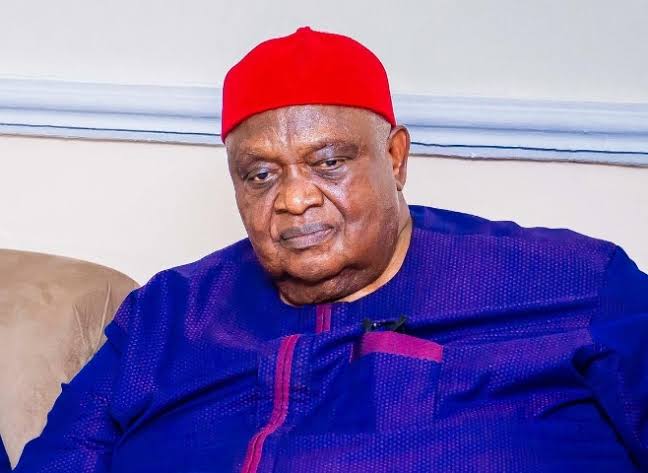
By Lubem Myaornyi, Abuja
President Bola Tinubu extended his heartfelt commiserations to the family of the late Chief Emmanuel Iwuanyanwu who passed away yesterday.Chief Iwuanyanwu who was the President-General of Ohanaeze Ndigbo Worldwide was an accomplished businessman and notable politician.
Tinubu condoled with the Imo State Government, the friends and associates of the deceased, and Ndi Igbo over this irreparable loss. The president affirmed that the departed elder statesman will always be remembered for his remarkable legacy and prayed for the repose of his soul and comfort to his family. The son of the deceased, Jide Iwuanyanwu announced his demise in a statement yesterday in Owerri.The statement read, “The Iwuanyanwu family of Umuohii Atta in Ikeduru Local Government Area of Imo State announces the demise of our patriarch, Engr Chief Emmanuel Chukwuemeka Iwuanyanwu-Ahaejiagamba Ndigbo.“Chief Iwuanyanwu died on Thursday, July 25, 2024, after a brief illness. He was aged 82.“Chief Iwuanyanwu is survived by his wife Lady Princess Iwuanyanwu many children and grandchildren including Dr Mrs Nwadiuto Iheakanwa Managing Director Champion Newspapers. Details of the burial will be announced later by the family after due consultations.”





